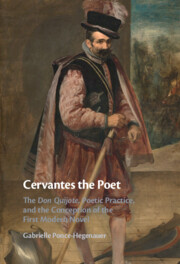 Cervantes the Poet
Cervantes the Poet Published online by Cambridge University Press: 11 May 2023
Chapter 4 resituates Cervantes’ poetics within the erotic philosophy of the sixteenth century, particularly in Judah Abravanel’s Dialoghi d’Amore ([Leone Ebreo], Rome, 1535). By 1569, Cervantes was serving in the court of the young Neapolitan nobleman Giulio Acquaviva in Rome, where Vicenzo Orsini’s gardens at Bomarzo were one of many private pastoral courts cultivated by various Italian noblemen throughout the region. Within pastoral poetics, the beloved, as embodiment of beauty, was often conceived of as the summa belleza or summum bonum in the natural world. In light of Abravanel’s influence on early modern poetics, this chapter studies Cervantes’ octavas for the Sicilian poet and fellow captive Antonio Veneziano that Cervantes wrote from Algiers and sent to Veneziano in 1579 in response to Veneziano’s own songbook, the Celia. They survive in Veneziano’s autograph manuscript (Biblioteca Centrale Regione Siciliana, Palermo) along with Veneziano’s sonnet response. This chapter concludes with Cervantes’ earliest dramaturgical work, the Trato de Argel (likely composed in Algiers or shortly upon his return to Madrid, ca. 1575–1582), in which he developed the concept of “love as faith” as transposing the religious within the confluence of Islamic and Christian beliefs. The Trato evidences figurations of intersubjectivity and female desire necessary for character formation in Cervantes’ subsequent fiction.
To save this book to your Kindle, first ensure no-reply@cambridge.org is added to your Approved Personal Document E-mail List under your Personal Document Settings on the Manage Your Content and Devices page of your Amazon account. Then enter the ‘name’ part of your Kindle email address below. Find out more about saving to your Kindle.
Note you can select to save to either the @free.kindle.com or @kindle.com variations. ‘@free.kindle.com’ emails are free but can only be saved to your device when it is connected to wi-fi. ‘@kindle.com’ emails can be delivered even when you are not connected to wi-fi, but note that service fees apply.
Find out more about the Kindle Personal Document Service.
To save content items to your account, please confirm that you agree to abide by our usage policies. If this is the first time you use this feature, you will be asked to authorise Cambridge Core to connect with your account. Find out more about saving content to Dropbox.
To save content items to your account, please confirm that you agree to abide by our usage policies. If this is the first time you use this feature, you will be asked to authorise Cambridge Core to connect with your account. Find out more about saving content to Google Drive.